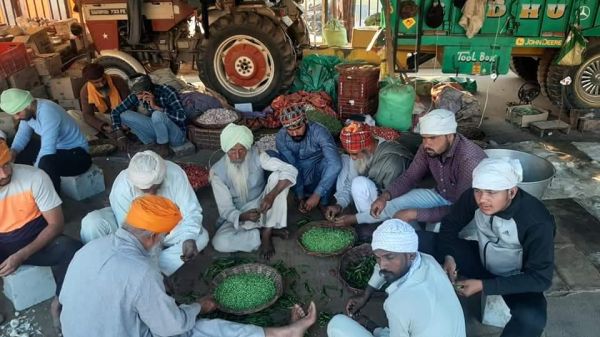Farmers protest in India

Most often we blog about environmental education from an adult perspective, so for our K-12 group, I invited this guest blog is by A. Arnav, an insightful 17 year old, 12th-grader at Springdales School, Pusa Road in New Delhi India. Arnav's mom worked with me to share his perspective on the plight of farmers in India and the effectiveness of raising awareness through peaceful protest with our eePRO community. I hope that you enjoy Arnav's wisdom. All best wishes, Donna Goodman
--------------------------------------------------------------------
For the past one year, come rain or sunshine, freezing cold and scorching summers, the bread producers of the country, both women and men, have been protesting on the borders of Delhi, the capital of India. They have been living in makeshift housing, several hundred kilometers away from their homes and fields to participate in the protest. The fields which they have been working for generations, for them to be a farmer is a matter of pride and their lands a matter of honor which they are not ready to part with even in the times of extreme economic crisis.
I being an urbanite was quite oblivious to the hardships the bread producer of the country was facing till one day, when a big social media circus popped up opposing Swedish environmental activist Greta Thunberg and pop music star Rihanna’s support of Indian farmers. It grabbed my attention as well and I became interested in understanding why the farmers are protesting. Further reading in the news media I came to know that they are protesting against the three farm laws which the Indian government brought forth in 2020. The protest movement is also called as the farmer and labor movement since it affects the farm laborers equally.
The government has emphasized the need of the new laws to modernize agriculture and bring investment into agriculture. However, according to the farmers, these laws are more in favor of the industrialists and capitalists, reducing the rights of the farmers on their own lands. Farmers also insist that these laws were rushed through during Covid lockdown without consulting the agricultural community or without proper debate and procedure in the Indian parliament. The main opposition political parties in the parliament also agree with the farmers regarding these laws.
I do not understand the three proposed farm laws too well, but what attracted my attention was another demand of farmers, the guarantee for Minimum Support Price (MSP). MSP is the price set by the government to purchase agricultural products from the farmers. The government sets the price for 23 commodities each year however, the farmers say they never receive this price. They want the government to guarantee this price by making a law. Farmers believe this kind of protection is needed in order get the fair price for their crops and to be able to keep producing food and other agricultural products for the country.
Another cry of their protest is against the idea of privatization of agriculture in India, which the farmers fear will be imposed with the new agriculture laws. They justify their fear by citing the privatization of dairy industry in England. In 1980, British households had 89% of their milk delivered by milkmen. By 2013 this figure had dropped to 3.2%. The smaller, more sustainable farms have been the worst casualties, while the large, intensive and least sustainable producers survive. And it is not just farmers who are suffering. Privatization is also worrisome for a common man, as it will lead to inflation in essential food items.
In the past, for decades farmer protests in most countries had remained focused on the need to provide a guaranteed price. But only recently, after several months of protests by Spanish farmers for a minimum support price, Spain has brought in a law in 2021 that prohibits sale of food below the cost of production. This is precisely what the farmers everywhere want, to hold the retailers and wholesalers accountable for the sale of farm products that results in losses for the farmers. This will strengthen small-scale agriculture and thus the economy of the country. France and Germany have also introduced laws to improve the food supply chain practices but have not been able to improve the existing system.
Eighty-seven farmer organisations and food justice groups in the United States delivered a solidarity statement in support of Samyukta Kisan Morcha, a united front of over 40 Indian farmers unions leading the historic protests. "India's farmers have mobilized to create one of the world's most vibrant protests in history against unjust farm laws that will increase agribusiness' stranglehold over their food system. They have rallied around a cry for the repeal of three laws — passed without farmers' knowledge or consultation — that aim to liberalize Indian agriculture and food sectors, not only at the cost of farmers, but also the food security of India's poor," the statement said.
Agriculture and food production is an important issue in a country like India with

The ongoing farmers movement in India, also unveiled many social aspects of people those depend on agriculture. There is a army of volunteers that contribute selflessly to this movement by bringing items such as milk, flour, lentils to sustain the langars (community kitchens) which provide daily meals to the protesting farmers. Various NGOs have supported the movement by providing basic facilities at the sites of the movement such as drinking water, laundry and sanitation services. The support showed by urban population of Delhi has also been tremendous.
What will be the outcome of the farmers protests I do not know, but one thing is for sure that these protests have given a true picture to the masses around the globe regarding challenges the Indian farmers face. Urban people like me now know more about farming and how it is sustaining the economy. The sites of the protest also serve as a platform for unifying people from different strata of the society fighting for a common cause. As for me, being occupied with my senior year of high school, I am trying to contribute to the cause by writing about it and sending it across.




